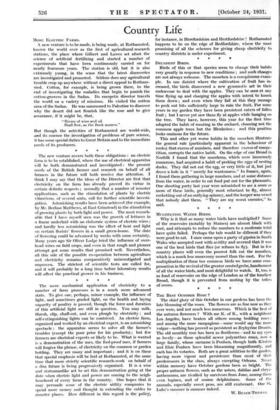* * * *
DECADENT BIRDS.
Birds of this or that species seem to change their habits very greatly in response to new conditions ; and sueh• changes are not always welcome. The moorhen is a conspiedouS exam- ple. In one district where the cultivation of fruit has in- creased, the birds discovered a new gymnastic art in their endeavour to deal with the apples. They can be seen at any time flying up and charging the apples with intent to 'knock them cloWn ; and even when they fail at this they 'manage to peck out bits sufficiently large to ruin the fruit. For simile years in my garden they have been persistent eaters of fallen fruit ; but I never yet saw them fly at apples while banging on the tree. They have, however, this year for the first time adopted the habit of roosting in the orchard, choosing not the common apple trees but the Blenheims ; and this position looks ominous for the future.
This and other yet worse habits in the moorhen illustrate the general rule (particularly apparent in the behaviour Of rooks) that excess of numbers, and therefore excess of compe- tition, corrupts the native habit. On the edge of one Broad in Norfolk I found that the moorhens, which were immensely numerous, had acquired a habit of Pecking the eggs of nesting ducks. They did not 'eat the egg, or very little of it, but just drove a hole in it "merely for wantonness." In Sussex, again, I found them gathering in large numbers, and at some distance from the water, in order to eat fOod put out for the pheasants. One shmiting party last year were astonished to see a score or more of these birds, generally most reluctant to fly, almost rocketting out of an outlying spinney, and the keeper was vexed that nobody shot them. " They are my worst enemies," he
said. * * * *














































 Previous page
Previous page